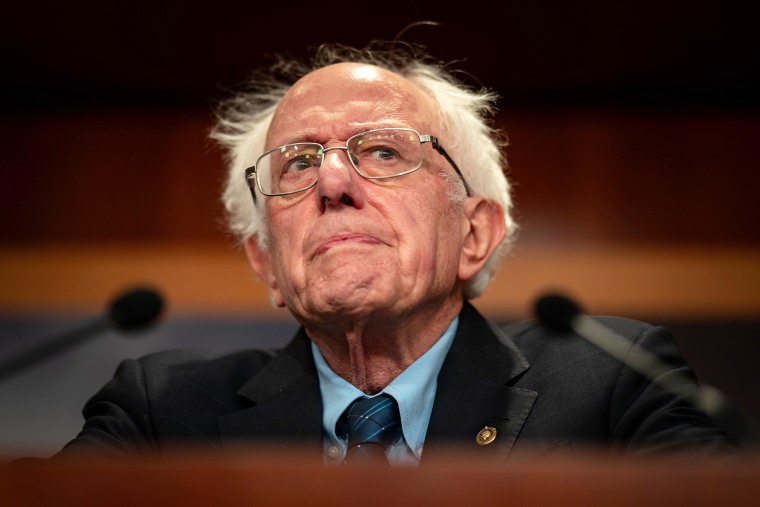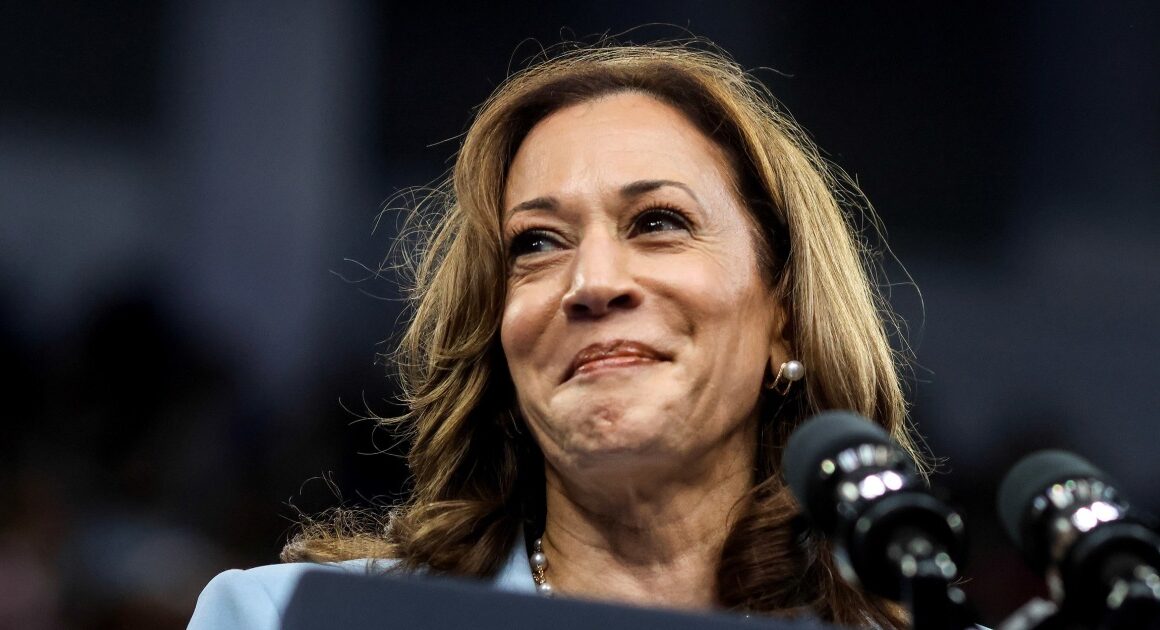WASHINGTON — In early 2020, Bernie Sanders had just won two back-to-back primaries and progressives appeared on the cusp of conquering the Democratic Party. But after losing that contest to Joe Biden and facing recent setbacks, the movement is recalibrating its ambitions in anticipation of a Kamala Harris victory this fall.
Gone are the skyscraping demands for Medicare for All and a Green New Deal to transform the health care and energy sectors, which Harris endorsed in her failed 2020 bid and is now backtracking from. Progressives are instead homing in on a more pragmatic and economy-focused agenda that includes a minimum wage hike, child care funding and new Medicare benefits for seniors.
Congressional Progressive Caucus Chair Pramila Jayapal, D-Wash., who has endorsed Harris, said progressives are playing the cards they’ve been dealt.
“I don’t think that perfection is ever on the ballot. But real progress is,” Jayapal told NBC News in an interview. “Unless Bernie Sanders or Elizabeth Warren were elected president, we still have work to do to get those full things to be mainstream.”
“So much of our … Progressive Caucus agenda is stuff that we know she is for, just as the Biden-Harris administration was for, and I believe the Harris-Walz administration will be for,” she said.
The left has rallied around the vice president in the binary contest against Donald Trump, even though progressive leaders have had little direct contact to discuss her vision for the presidency. In a sign of that tension, Sanders, I-Vt., has been slow to endorse Harris, but on Friday he praised her early policy rollouts on tackling the costs of food, housing, medicine and child care.
It’s been a rough year for progressives. Two members of the House’s left-leaning “Squad” — Reps. Jamaal Bowman, D-N.Y., and Cori Bush, D-Mo. — lost their primaries in safe blue districts to more moderate Democrats. It’s the movement’s first electoral backsliding after six years of successfully zeroing in on various Democratic strongholds to elect progressive stalwarts. Activists blame it on millions of dollars spent by the pro-Israel group AIPAC and its allies to unseat lawmakers critical of Israel’s actions in Gaza since the Oct. 7 Hamas attack.
Asked what lesson she takes from Bush and Bowman losing, Jayapal said, “I see as the lesson that we need to get big money out of politics.”
Other prominent party members associated with the left, including Sen. John Fetterman, D-Pa., and Arizona U.S. Senate candidate Ruben Gallego, have abandoned the label amid disagreements over issues like migration and border policy, among others. Gallego, currently a congressman representing the Phoenix area, left the Progressive Caucus this year as he leans rightward on border security.

This year, the Democratic Party more broadly has drifted substantially to the right on immigration while seeking to bolster law enforcement. Some in the party are also de-emphasizing progressive social causes in their campaigns.
As the electorate’s views have shifted, one senior aide to a Senate Democrat said they have noticed a definite impact on “how Democrats talk about these kinds of things.”
“You don’t really see a lot of Democrats trying to bear-hug criminal justice reform and policing” reform, this person said. “And you definitely see Democrats [concede] the whole school closure thing during Covid. … And that really set back some kids’ developments. So it’s in the mind, it’s in the psyche.”
Recent polls highlight these changes, even among the Democratic electorate. This spring’s Harvard Youth Poll found that 53% of voters between 18-29 feel there is an immigration crisis at the southern border. Just 16% disagreed with that notion. That poll showed that young men went from a +22 Democratic advantage to just +3 over the last four years. Over the same time, young women became 6 points more Democratic.
“This country is different during economic good times versus economic bad times,” Bill McInturff, a Republican pollster who co-conducts surveys for NBC News, said, adding that inflation and concerns over the economy have “people feeling very stretched and thinking ‘I’ve got my own big-time problems. So I have a certain tolerance for worrying about other stuff.’”
A Pew Research Center survey, released in June, showed significant drops in support for some progressive social messages. The share of Democratic voters who believe white people benefit a great deal from advantages in society that Black Americans don’t dropped 16 points between 2020 and 2024. The same survey showed the number of Democrats who say gender is determined by sex assigned at birth increased 9 points since 2017.
Will Stancil, a policy researcher who last week lost a Democratic state House primary in Minnesota, said the GOP war on “woke” has led Democrats to be less forceful in pushing back on “basic things like ‘racism is a real problem, you need to fight back against it.’”
“This to me is not controversial,” he said. “And we’re having a really hard time now establishing what I would have considered a few years ago pretty widely shared fundamental premises about what is and is not OK in society.”
Perhaps Pew’s most consequential findings were about immigration. The percentage of Democrats who said undocumented immigrants should not be allowed to stay in the country legally grew to 16%, up 9 points from 2017. Among all voters, that number increased 19 points since that year.
“It’s immigration that is changing everything right now,” a Republican Senate aide said, describing the shift in polling as “massive” and adding, “I never thought I would see” the increased support for deportation that Pew showed.
Usamah Andrabi, a spokesperson for the progressive campaign group Justice Democrats, attributed the backlash to right-wing interests pushing back on progressive victories.
“We saw pieces of legislation that were shaped by [progressives], like the Inflation Reduction Act, historic investments in climate change, historic investments in jobs. … If you ask Democratic districts about these policies, they’re overwhelmingly popular, they’re overwhelmingly popular amongst all voters,” he said.
Other Democrats say the progressive wins of the Biden era were not fully appreciated in some corners of the left — which they said could make it more difficult to pass progressive legislation in a future administration. The Democratic Senate aide felt there wasn’t “any appreciation” for the left’s role in helping shape Biden’s agenda and that progressives have “more of an interest in showcasing how distinct they are from the institutional Democratic Party rather than sort of seeing the Democratic Party as a means to an end.”
Stancil echoed the aide, saying the key divide on the left now is between those who do and don’t define themselves in opposition to the Democratic Party.
“At the fringes, you’ve seen what I would describe as a progressivism centered around getting stuff done, around specific policy issues, kind of curdle into a leftism centered around almost this apocalyptic rhetoric of ‘we’re doomed, nothing can save us, America is doomed, burn it all down,’” Stancil said. “And there’s kind of a gleefulness about this that I sometimes think is hard to distinguish from the far right.”

Beyond that, waves of pro-Gaza protests across the country have brought some instances of antisemitic rhetoric and vandalism that overshadowed the cause of Middle East peace and sparked broad denunciations from Democratic leaders, as Republicans seek to link the entire Democratic Party to the fringes. Pro-Israel Rep. Ritchie Torres, D-N.Y., who represents a deep-blue district, also left the Progressive Caucus this year amid its response to the Gaza conflict. Fetterman has engaged in open political warfare against the left in his support of Israel’s bombardment of Gaza, saying the time to discuss a cease-fire is after Hamas has been destroyed.
There have been wins, though.
Progressives rallied against Pennsylvania Gov. Josh Shapiro and behind Minnesota Gov. Tim Walz during Harris’ veepstakes, with Harris ultimately settling on Walz as her No. 2. Advocates feel energized by the rise of Harris, which has given the party renewed hope after Biden ended his struggling re-election campaign. Some are willing to give Harris the space she needs to abandon her past positions and lean rightward on issues like immigration in the final months of the election.
“I am 100% done with this loser, backbiting bulls— less than three months before the election. We have to win,” said a progressive organizer who requested anonymity to speak candidly about peers. “We’re not in an advocacy moment now; we’re in a win-the-damn-election moment. We’ll shift into advocacy on Nov. 6, and if we’re successful in the next couple months, we’ll have the opportunity then to push a Democratic president and Democratic Congress to enact good legislation.”
“The absolute worst thing that could happen for immigration would be a Trump win,” the activist said. “The second worst thing to happen would be winning the White House but losing the Senate.”
Democrats face a steep uphill climb in holding the Senate majority. If Harris wins and Republicans seize control of the chamber, they would have an effective veto over her legislative agenda — and the Progressive Caucus’ agenda.
Jayapal said the left is being targeted because of its successes.
“I don’t feel like it’s been a recalibration,” she said. “I actually feel like progressives have come out on top in most ways. I measure our success by what we got done. I think Joe Biden and Kamala Harris have been the most progressive administration that we’ve had in my lifetime.”
For Republicans, there’s acknowledgment that even amid some setbacks, progressives remain formidable opponents.
As the Republican Senate aide said: “I would not be ready to bury the left just yet.”
,









